In today's competitive job market, crafting an effective resume is more crucial than ever.
This blog post shares 58 resume statistics to inform your choices.
Drawing on a wide array of sources, we've compiled compelling statistics that reveal the nuances of modern resume writing. With recruiters spending mere seconds on initial resume scans, understanding these trends is pivotal.
In this blog, we will look at the following statistics:
- Resume writing strategy
- Resume content choices
- Likelihood of resume rejection?
- Showcasing your skills
- Is your resume structurally sound?
- Things to avoid when writing a resume
Resume writing strategy
1. Resumes that detail a change of industry are on the rise. Only 35% of people who started a new job in the past two years took a role in the same industry. (McKinsey)
2. 40% of the sourcing process is outsourced to RPOs, who mainly scour LinkedIn for the right candidates. Make sure that your resume matches your online footprint. (HBR)
3. On average, you need to send 50-100 resumes to secure a new role. (Zippia)
4. After analyzing 750,000 resumes, the average years of experience on a resume was 5.1 (Resume.io)
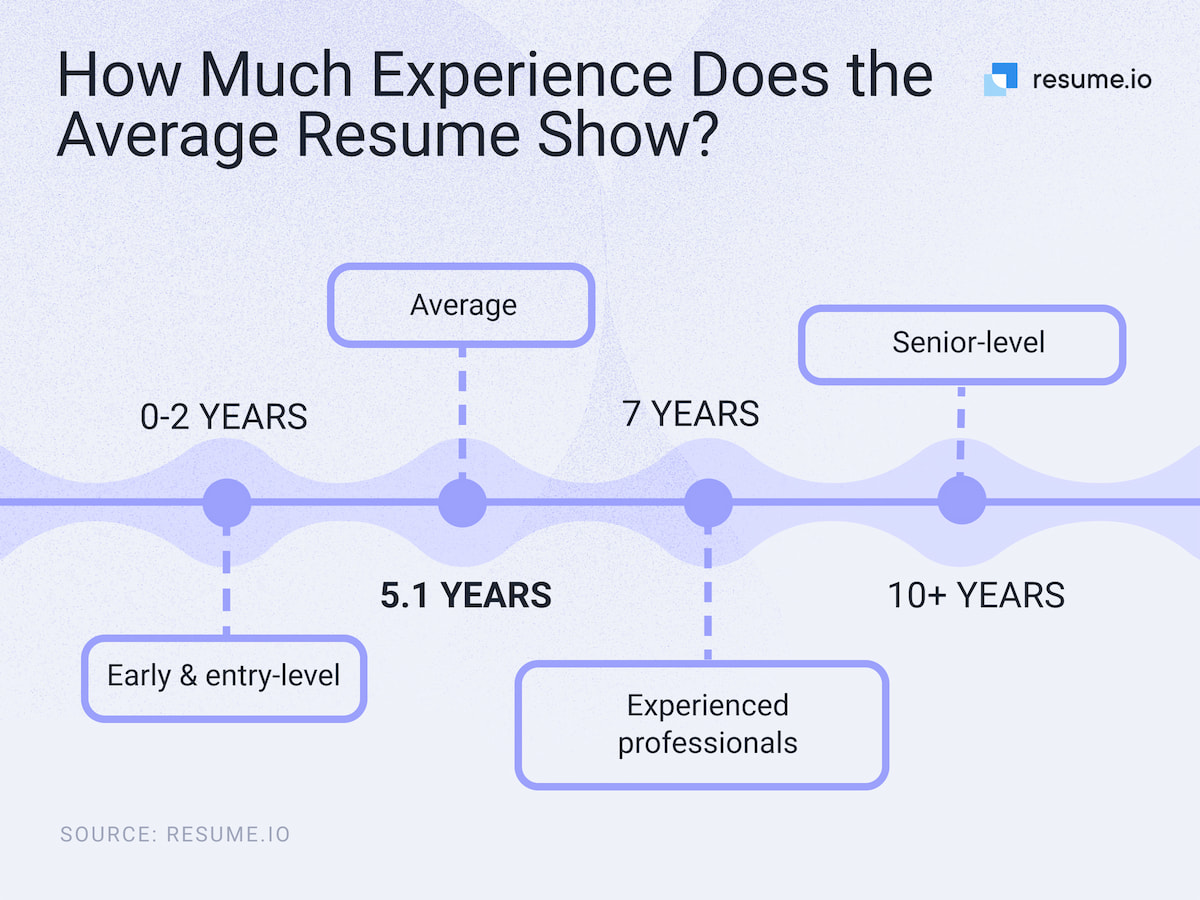
5. 70% of the global workforce is passive talent, with 30% active job seekers, so it is likely that you will be approached for a role when you may not be looking. Have a version of your resume ready to go. (LinkedIn)
6. 58% of recruiters will be using AI to augment recruitment technology and 29% of recruiters will be using it very frequently. 36% will use it for resume matching. Write your resume with ATS software and AI in mind. (Jobvite)
7. Share your resume on the most popular channels—job boards (60%), social networks (56%), and word of mouth (50%). Jobs won’t always come to you. (LinkedIn)
8. 60% of employers research candidates on social media, but a resume is still essential for them, and the 40% who do not. (Career Builder).
9. 75% of executives reported an increased emphasis on diversity hiring. Do not be scared to highlight the benefits of your diversity on your resume (Jobvite)
10. 98% of Fortune 500 companies use ATS software in the recruitment process. Write your resume to pass this initial stage. (Jobscan)
11. New employees sourced through LinkedIn are 40% less likely to leave in the first 6 months. Transfer your resume details onto your LinkedIn profile. (LinkedIn)
12. On average, every job opening attracts 250 applicants. 4-6 of these applicants will receive an interview invitation. (Inc)
Resume content choices
13. The most overused words on resumes include: “expert, organizational, strategic, driven and motivated.” Find some synonyms. (Career Builder)
14. 86% of employers are focused on passive candidates. Have a resume ready to go, even if you are not actively looking. (HBR)
15. 64% of resumes are customized for the job position to some extent. (Glassdoor)
16. Engagement is higher (37%) vs. burnout (27%) for fully remote roles. Emphasize your efficiencies and engagement in your resume if you work remotely. (Gallup)
17. 4 in 10 employees are currently working in a hybrid role. Do not be scared to include this in your resume. (Gallup)
18. 24% of hiring managers spend less than 30 seconds reading each resume. (Career Builder)
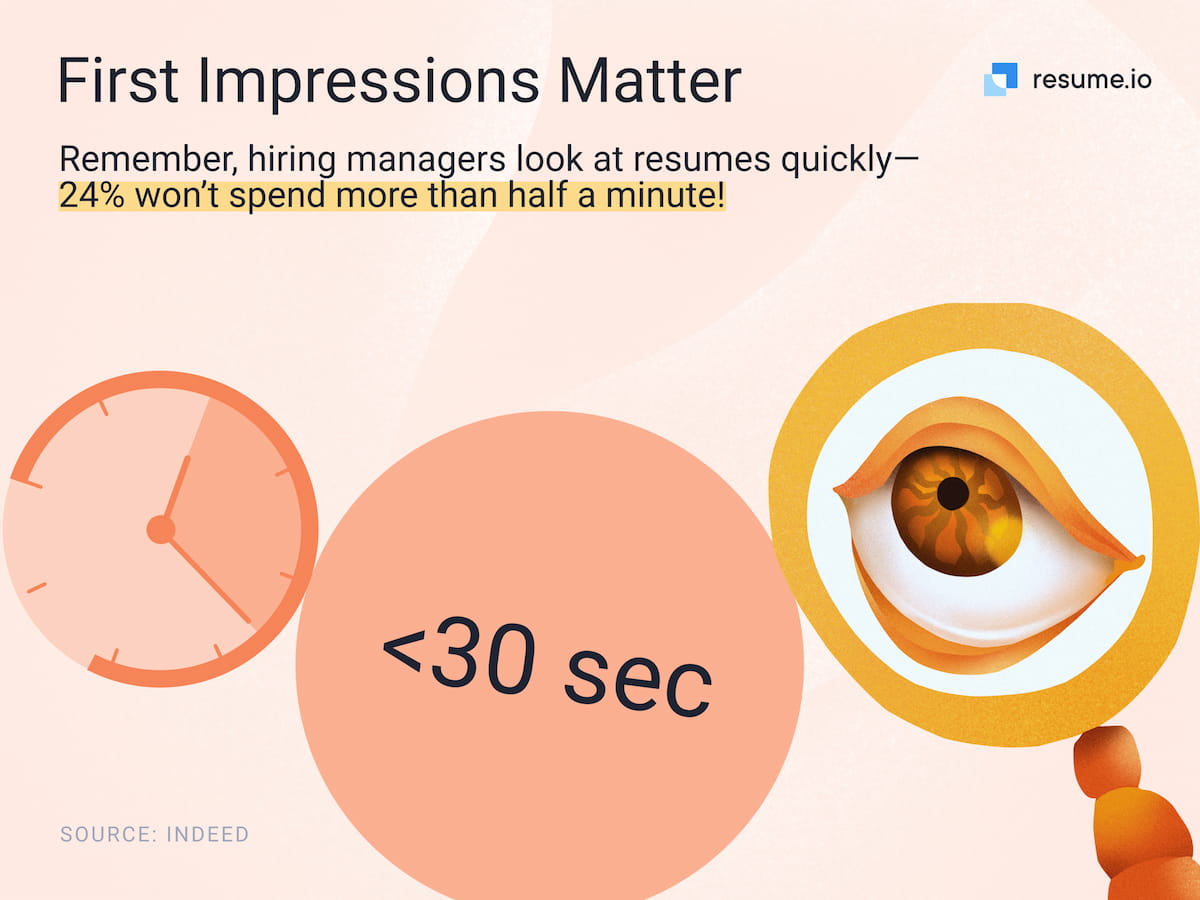
19. A professionally written resume boosts your earning potential by 7% to 32%. (Zippia)
20. Only 48% of resumes include a link to a LinkedIn profile (Cultivated Culture)
Is resume rejection likely?
21. 88% of resumes are rejected because of a photo on the resume (TeamStage)
22. Only 2% of resumes are successful in securing an interview. (Zippia)
23. Recruiters spend 60 seconds scanning a resume. This is a more believable figure than the six seconds that is often sensationally quoted. (Forbes)
24. Only 25% of resumes make it past the ATS selection stage. (CIO)

25. 20% of recruiters will reject a candidate before they have finished reading the resume (Undercover Recruiter)
26. Over 80% of resumes don’t make it past the first screening and only 1 in 10 get to a hiring manager. (Workopolis)
27. 75% of hiring managers have caught a lie on a resume. Just don’t do it. (Motley Fool)
28. 94% of resumes include a personal email address. 4% include an email from an educational institution. 2% include a business email. (Resume.io)
29. 45% of recruiters are reporting a lack of qualified candidates. Tailor your resume to the specific role (Jobvite)
How do you showcase your skills?
30. 72% of candidates felt that having a valid skill set was more important than education to their prospective employer. (Career Builder)
31. Candidates shared 8 core skills on average on their resumes. The skills shared the most were: customer service, organizational skills, and advanced computer skills. (Resume.io)
32. 5% of candidates are dishonest when describing their skills and experiences on their resume. (Undercover Recruiter)
33. Employers prefer a GPA of 3.5 to 4.0 or more. Any lower than this and it may not be worth including on your resume for mid and senior-level roles. (Indeed)
34. Candidates who used AI to assist in writing their resume are 8% more likely to be hired. (MIT Sloan)
35. 41% of recruiters look for skills on a resume first. (Indeed)
36. 62% of job descriptions list leadership and management as essential skills. (Career Builder)
37. The top soft skills recruiters find lacking in job applicants include problem-solving (37%), resilience (32%), and communication (31%). (Market Splash)
38. 40% of recruiters say that the applicant lacks the necessary soft skills for the job (TeamStage)
39. 72% of people have lied about their skills on their resume. (Business Insider)
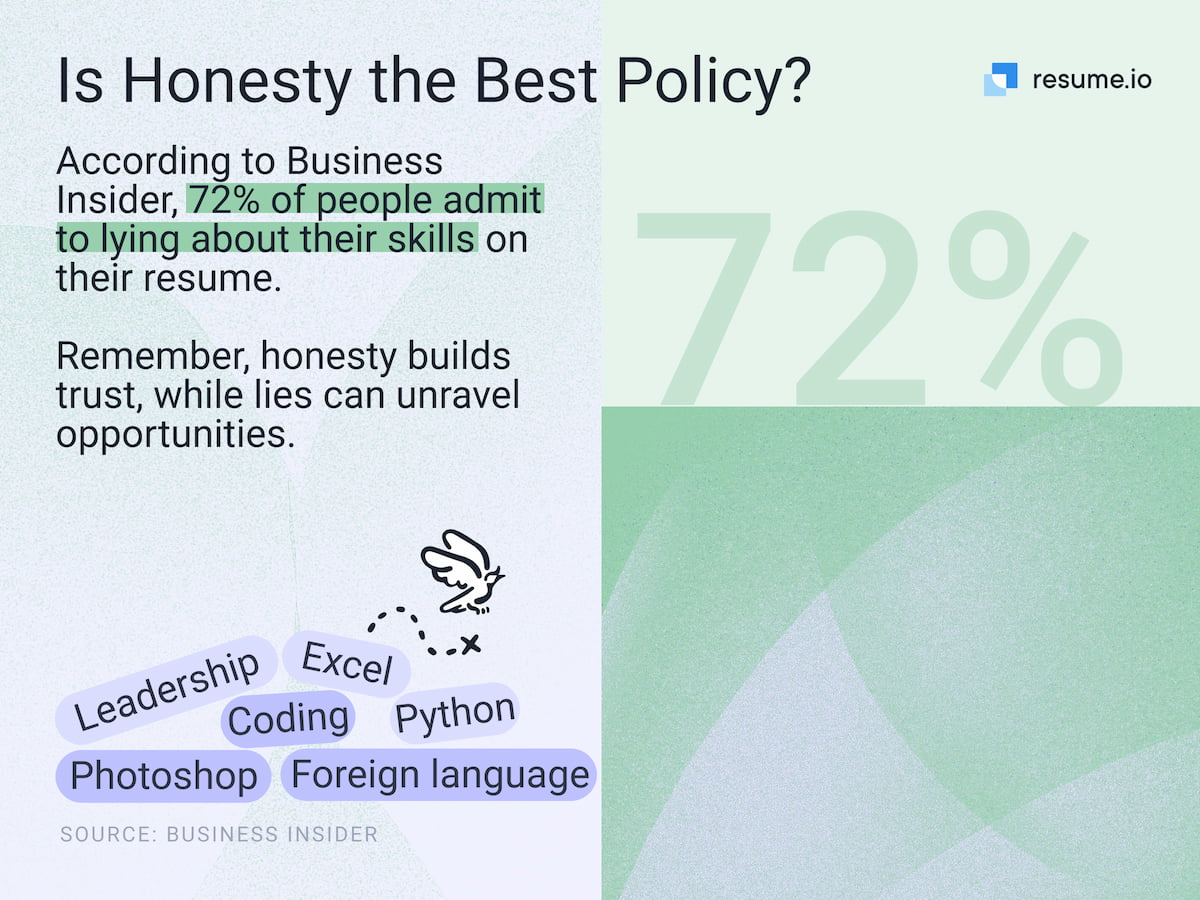
40. According to recruiters, the top reasons for rejecting a resume are the following: impersonal applications (84%), no thank you note (57%), and lack of resume customization (54%). (Zippia)
41. Applicants with fewer than 90% of the words in their resume spelled correctly had only a 3% chance of surviving their first month on the job. (MIT Sloan)
42. 53% of job listings require interpersonal skills on a resume. (Career Builder)
43. 68% of candidates who used a resume writing service got a job within 90 days. (Motley Fool)
Is your resume structurally sound?
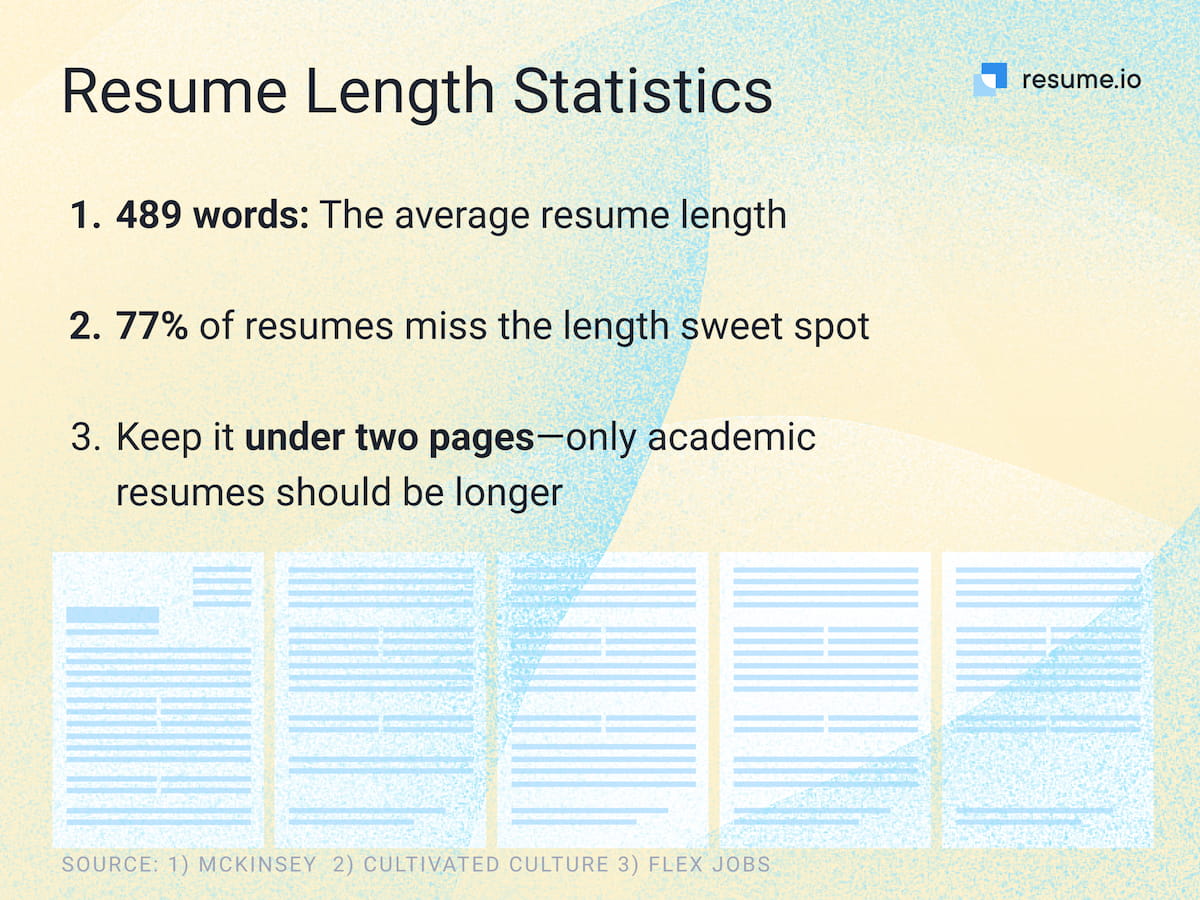
44. The average length of a resume is 489 words. (McKinsey)
45. Having said that, a sweet spot length for a resume is between 500 and 600 words; 77% of resumes are outside this range. (Cultivated Culture)
46. 61% of hiring managers consider a customized resume the number one tactic for applicants to boost their chances of getting a job. (Zippia)
47. 61% of hiring managers read the experience section first. (Things Career Related)
48. A resume should be a maximum of two pages. Only academic resumes can (and should) be longer. (Flexjobs)
49. The average number of job positions on a resume was 2-3. (Resume.io)
50. While the average job description contains 43 keywords, candidates only match 51% of the relevant keywords and skills on their resumes (Cultivated Culture).
51. The average resume is 1.6 pages long and takes 70 minutes to complete. (Market Splash)
52. A candidate with a two-page resume (not a one-page resume) is 1.4 times more likely to be hired for an entry-level job and 2.9 times more likely for a managerial position. (Market Splash)
53. A resume that is longer than two pages will be a deal breaker for 17% of hiring managers. (Motley Fool)
54. With 750,000 resumes analyzed, 18% of resumes include a full home address. 85% have the city filled in. A surprising 15% include no address details at all. (Resume.io)
55. The font on a resume should not be more than 12pt. (Flexjobs)
56. 40% of recruiters will be put off by an inappropriate design of a resume. (Undercover Recruiter).
57. 76% of resumes are ignored if applicants have an unprofessional email address. (Teamstage)
58. 82% of resumes have no side projects. Education and work experience tend to dominate. (Glassdoor)
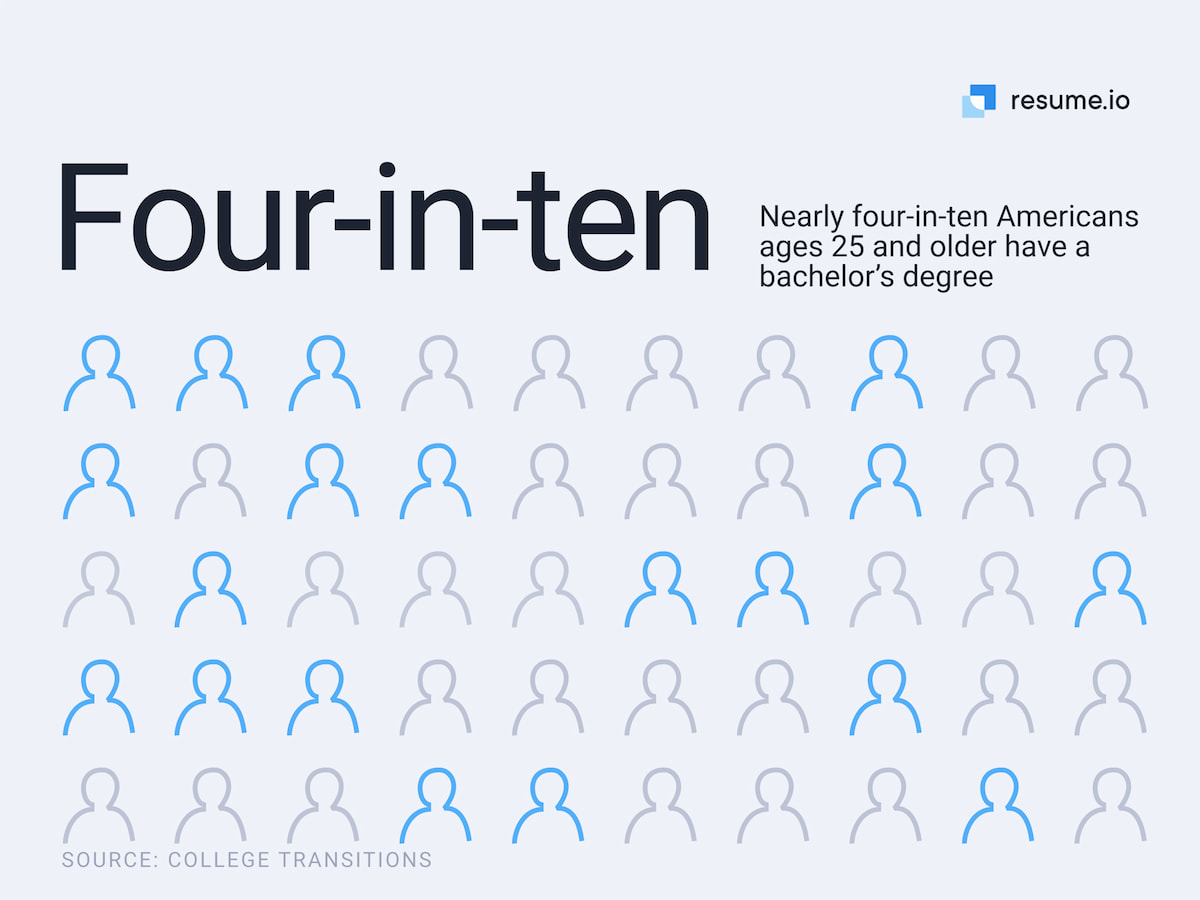
Top reasons why resumes are rejected
While it is easy to get lost in the statistics, it is important to remember the key attributes of what makes a successful resume. Have a think about these reasons why hiring managers reject resumes. Remember, to start with they are looking for reasons to disqualify you from the process rather than the other way around. They have such a huge volume of initial applicants to process that they simply don’t have time for a more quality-led approach.
Make sure that you are not making the following resume writing mistakes.
Lack of relevance. Hiring managers often reject resumes that don't clearly match the job's requirements. If your skills and experience don't align with the position, your resume may be overlooked.
Poor formatting. Resumes that are difficult to read due to bad formatting, such as dense blocks of text or inconsistent font usage, can quickly lead to rejection. Clear, professional formatting is crucial.
Typos and errors. Even small spelling or grammatical errors can suggest a lack of attention to detail, leading hiring managers to question the applicant's professionalism and care.
Too long. Lengthy resumes can overwhelm or bore the reader. It's best to keep resumes concise, ideally to one or two pages, focusing on the most relevant information.
Vague achievements. Listing job responsibilities without clear achievements can make it hard for hiring managers to assess your impact. Quantifiable achievements can make a resume stand out.
Generic objectives. Generic or irrelevant objective statements can signal a lack of specific interest in the role or company, making the resume less engaging to the reader.
Unexplained gaps. Employment gaps without explanation can raise questions about a candidate's reliability or career trajectory. Briefly explaining gaps can mitigate concerns.
Overuse of jargon. While industry-specific terms can be relevant, overusing jargon or including irrelevant technical lingo can confuse or alienate non-specialist hiring managers.
Inappropriate email address. Professionalism extends to your contact information. An unprofessional email address can make a bad first impression.
Irrelevant information. Including personal information that isn't relevant to the job, such as hobbies or personal details, can detract from the key message of the resume. Focus on what's relevant to the position.
Understanding resume statistics is a critical component in navigating today's job market effectively; it’s about understanding the 'why' behind successful job applications.
These 58 resume statistics represent the collective experiences of job seekers and the evolving preferences of employers across various industries. Leveraging these statistics in crafting your resume will help you significantly enhance your visibility and appeal to potential employers.
Key takeaways
- Think about your situation and which resume statistics are relevant for you.
- Always look at the source of any statistic—do they have an ulterior motive?
- Don’t let a rogue stat put you off—there are always exceptions.
- Use your common sense. Put your needs first when writing your resume.
- LinkedIn.com
- McKinsey.com
- Forbes.com
- HBR.org
- CultivatedCulture.com
- EmployInc.com
- Zippia.com
- TheUndercoberRecruiter.com
- Research.Glassdoor.com
- Indeed.com (Resume Skills Recruiters Look For)
- Indeed.com (Do Employers Care About GPA?)
- Glassdoor.com
- ThingsCareerRelated.com
- Cio.com
- Jobscan.co
- TeamStage.io
- FlexJobs.com
- Fool.com (5 Resume Stats All Job Seekers Should Know)
- BusinessInsider.com
- Fool.com (Does It Pay to Use a Resume Service? New Data Says Yes)
- Gallup.com
- Mitsloan.mit.edu
- MarketSplash.com
- Careerbuilder.com
- TheLadders.com
- Berkley-Group.com





